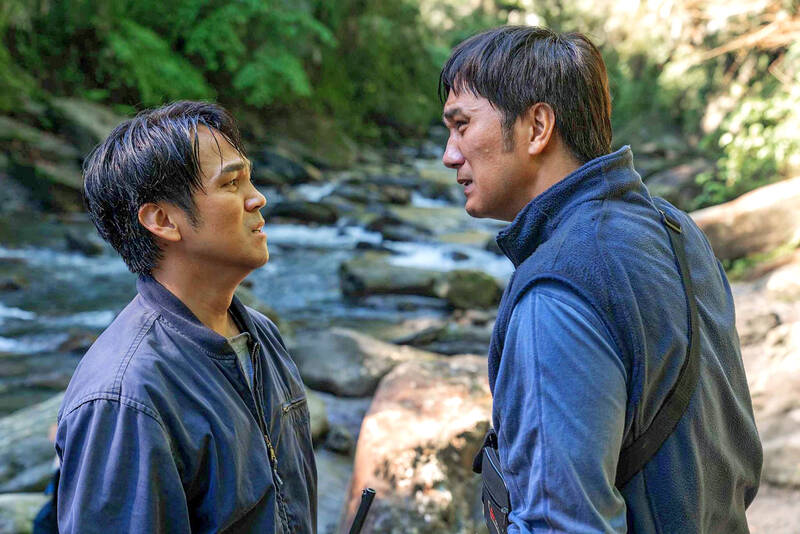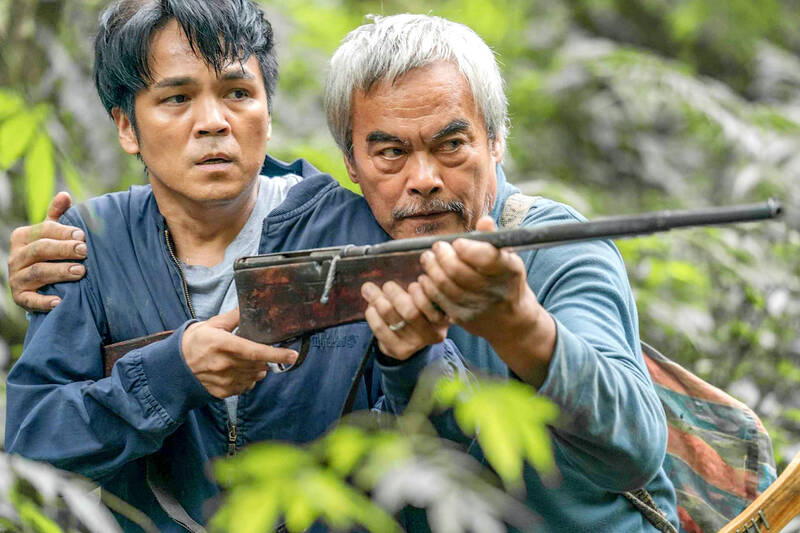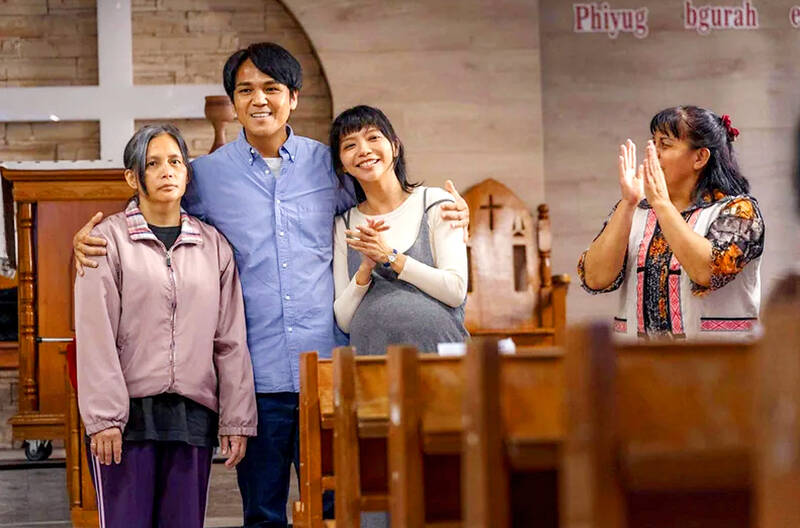Indigenous Truku doctor Yuci (Bokeh Kosang), who resents his father for forcing him to learn their traditional way of life, clashes head to head in this film with his younger brother Siring (Umin Boya), who just wants to live off the land like his ancestors did.
Hunter Brothers (獵人兄弟) opens with Yuci as the man of the hour as the village celebrates him getting into medical school, but then his father (Nolay Piho) wakes the brothers up in the middle of the night to go hunting. Siring is eager, but Yuci isn’t. Their mother (Ibix Buyang) begs her husband to let Yuci stay home, saying that he isn’t suited for hunting, but this only makes the father angrier.
“I’ve inherited such a good hunting ground, but my grown-up son doesn’t even know how to hunt,” the father shouts. He dies that night in an accident.

Photo courtesy of Activator Co
Years later, Yuci has become the village doctor. He is expecting a child with his Han Taiwanese wife Yi-wen (Amy Hsu, 許靈勻), he cares for his mother who suffers from dementia and he’s mulling selling the hunting ground to developers. But his life is overturned when Siring is released from prison for an unspecified crime.
The brothers are complete opposites: Yuci is serious and brooding, while Siring is carefree and brash. Yuci wants Siring to get a job and settle down, but Siring wants to hunt and farm on their ancestral land, even bringing his mother along to Yuci’s horror — and a dramatic, emotional tale unfolds.
Tradition versus modernity is a time-honored theme in Taiwanese cinema, but it’s an especially urgent topic among indigenous communities. After centuries of marginalization and assimilation, they continue to grapple with how to reclaim and preserve their culture while trying to prosper in modern, mainstream society.

Photo courtesy of Activator Co
The father’s death symbolizes the fading of tradition, leaving the brothers to figure out these issues in a rapidly changing world. The mother maintains their connection to each other and the past, but even her mind is dissolving.
Even if one has the desire to live the old ways like Siring, is it really possible under the pressures of the modern world? It’s easy for the audience to be more sympathetic to Siring, but is it a bad thing for Yuci to have his own aspirations? Despite being clearly haunted by the past, he still returned home to serve in the community clinic instead of pursuing a position at a hospital, conversing with the villagers in Truku instead of Mandarin. This bit is intriguing as it’s often when young people move to the cities to find work that their ties to traditional culture and language are cut off and no longer transmitted to their children.
Director Su Hung-en (蘇弘恩), who is half Truku, says that the film is inspired by real-life situations he witnessed in his mother’s community, especially his many uncles with contrasting personalities who often butt heads. Even though parents urge their children to focus on their studies, they also want them to carry on their culture, often favoring those who can, for instance, hunt better. On the other hand, his mother is a respected doctor outside of the village, but at home she’s still bound to patriarchal conventions.

Photo courtesy of Activator Co
Su grew up identifying with his Han Taiwanese side, but his first feature, the 2015 documentary The Mountain (靈山), followed his grandfather’s daily life hunting, farming and praying to the ancestral spirits in the mountains. The fiercely independent Truku were defeated by Japanese colonizers in 1914, enduring decades of discrimination and forced “civilization” afterward. Even though the grandfather was his village’s top hunter, he had to leave to find work and support his family, only returning to his preferred ways in old age after saving up money to rebuild the hunting lodge.
Given this background, it makes sense why Su made this film. But most of all, the tension-filled plot is gripping and the actors deliver vivid and convincing portrayals. There are bits that are not exactly clear, such as why Siring went to jail, which leads to some confusion throughout the film, but overall the story is coherent and suspenseful.
Finally, despite getting much screen time, the character and background of Yuci’s wife, Yi-wen, could have been fleshed out a bit more. As the only Han and outsider character (this is only made explicit in promotional material), it would have been interesting to delve more into her perspective about being caught up in the family strife.

The 1990s were a turbulent time for the Chinese Nationalist Party’s (KMT) patronage factions. For a look at how they formed, check out the March 2 “Deep Dives.” In the boom years of the 1980s and 1990s the factions amassed fortunes from corruption, access to the levers of local government and prime access to property. They also moved into industries like construction and the gravel business, devastating river ecosystems while the governments they controlled looked the other way. By this period, the factions had largely carved out geographical feifdoms in the local jurisdictions the national KMT restrained them to. For example,

April 14 to April 20 In March 1947, Sising Katadrepan urged the government to drop the “high mountain people” (高山族) designation for Indigenous Taiwanese and refer to them as “Taiwan people” (台灣族). He considered the term derogatory, arguing that it made them sound like animals. The Taiwan Provincial Government agreed to stop using the term, stating that Indigenous Taiwanese suffered all sorts of discrimination and oppression under the Japanese and were forced to live in the mountains as outsiders to society. Now, under the new regime, they would be seen as equals, thus they should be henceforth

With over 100 works on display, this is Louise Bourgeois’ first solo show in Taiwan. Visitors are invited to traverse her world of love and hate, vengeance and acceptance, trauma and reconciliation. Dominating the entrance, the nine-foot-tall Crouching Spider (2003) greets visitors. The creature looms behind the glass facade, symbolic protector and gatekeeper to the intimate journey ahead. Bourgeois, best known for her giant spider sculptures, is one of the most influential artist of the twentieth century. Blending vulnerability and defiance through themes of sexuality, trauma and identity, her work reshaped the landscape of contemporary art with fearless honesty. “People are influenced by

The remains of this Japanese-era trail designed to protect the camphor industry make for a scenic day-hike, a fascinating overnight hike or a challenging multi-day adventure Maolin District (茂林) in Kaohsiung is well known for beautiful roadside scenery, waterfalls, the annual butterfly migration and indigenous culture. A lesser known but worthwhile destination here lies along the very top of the valley: the Liugui Security Path (六龜警備道). This relic of the Japanese era once isolated the Maolin valley from the outside world but now serves to draw tourists in. The path originally ran for about 50km, but not all of this trail is still easily walkable. The nicest section for a simple day hike is the heavily trafficked southern section above Maolin and Wanshan (萬山) villages. Remains of